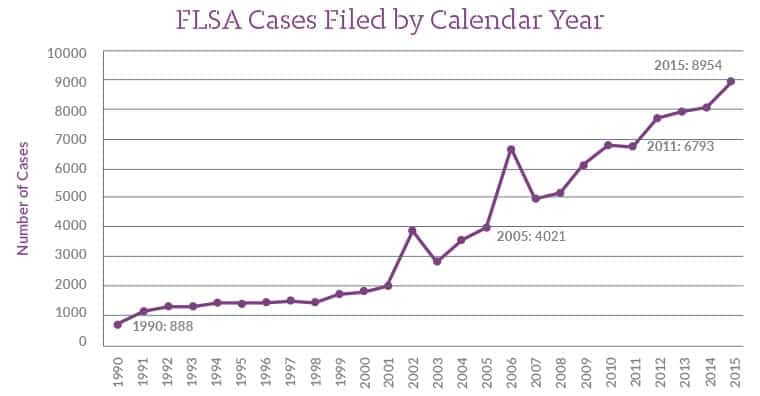With the expanded overtime regulations on hold, you may think your school district has been granted a reprieve.
In that case, you’re only half right.
Whether the overtime regulations are passed, blocked or modified, the renewed focus on the Fair Labor Standards Act (FLSA) could pose issues — in more ways than one. Now that the media has brought wage and hour laws into the spotlight, school districts could face a mounting number of Department of Labor investigations and lawsuits (both class action and private).
Department of Labor Investigations
The DOL’s Wage and Hour Division has already audited school systems in every state, as you can see from the interactive map below.
Every investigation into K-12 organizations is marked, including those where no FLSA violations were found. Investigations uncovered violations in nearly 2/3 of organizations.
Mouse over the map to see how many violations were found and how much noncompliance cost each organization.
Source: Wage and Hour Compliance Action Data, U.S. Department of Labor. Accessed October 2016.
Note: This data is representative of DOL investigations into FLSA compliance across K-12 organizations only. It does not include private or class action lawsuits filed in federal or state courts.
So far, these investigations have found over 15,000 violations — costing American school districts nearly $33 million in back wages and penalties. In one case, a district was assessed almost $1.75 million in damages.
You don’t want your district to be next. If your district hasn’t been found noncompliant in the past, don’t get complacent: repeat offenders account for only 3% of violations and 4.5% of damages.
And with the spotlight on employee wages, chances are good that the Department of Labor will continue to aggressively audit employers of every kind, regardless of any changes that may (or may not) be made to the overtime rules.
Employee Lawsuits
The last time the Department of Labor became involved with changes to FLSA, lawsuits surged — even before the changes were formally adopted. Ed Bergmann, senior partner of international law firm Seyfarth Shaw LLP, tells Legal News Line that having labor laws in the news tends to spark an epidemic of lawsuits.
“‘Whenever you have that going on, there’s a heightened interest in the field, and people become familiar and more aware of the FLSA and what types of claims can be made under it, so you tend to see an uptick in litigation during these periods when there’s a lot of discussion,’ Bergmann said. ‘We saw that in 2004 during the last time the [regulations were updated] … Plaintiff’s lawyers in general see this as a very fertile ground in litigation, so they’re gravitating toward this area more and more.’”
This graph, courtesy of The Day Shift, shows a clear upward trend in FLSA lawsuits filed in federal courts over the years. Also visible is a spike in cases filed before new regulations were implemented, and soon after. Unlike the map above, this data includes all FLSA cases, not just those against K-12 school districts. But here’s something to consider: in 2002, over 40% of all FLSA lawsuits involved public school systems.
 Source: Hass, Douglas A. “FLSA Minimum Wage, Overtime Lawsuits Set New Record in 2015, Filing Growth Continues.” The Day Shift. 4 Jan. 2016.
Source: Hass, Douglas A. “FLSA Minimum Wage, Overtime Lawsuits Set New Record in 2015, Filing Growth Continues.” The Day Shift. 4 Jan. 2016.
School districts are obvious targets for FLSA lawsuits for a few reasons:
- Many school districts allow nonexempt employees to volunteer at district-sponsored events or coach athletics teams. If a stipend or small fee is provided in return, the opportunity for litigation arises.
- School districts without a defensible time tracking system may only pay for the hours employees are budgeted and scheduled to work — not their actual hours worked.
- Some staff may work multiple jobs with different pay rates, such as bus drivers who also work in the cafeteria.
A Cautionary Tale for School Districts
In the early 2000’s, while the DOL discussed making overtime modifications, a consortium of attorneys called the School Litigation Group brought wage and hour lawsuits against hundreds of school districts.
The attorneys targeted nonexempt school staff by advertising their services on a website vowing to “try to help get you the money you deserve” and leaving flyers on employees’ personal vehicles in school parking lots. Determined to leave no stone (or potential case) unturned, they also held town meetings and placed ads with local newspapers and television channels.
Their efforts worked, and they represented thousands of school employees — leading districts to settle for $15 million in Mississippi alone. Their successes even led to the Department of Labor calling school districts’ pay practices a “systemic failure of school districts to understand and comply with basic wage and hour laws.”
It’s not far-fetched to believe that something very similar could happen again due to the recent high-profile media coverage of America’s federal labor laws.
Protecting Your School District
There’s no question about it: with school systems being perceived as easy targets, you must act now to ensure that your processes and recordkeeping are undisputable.
Here’s how.
Validate employee classifications.
Your district’s employee classification is one of the first things auditors will validate. Classifying employees as exempt from overtime simply because they’re paid on a salary basis is not compliant with FLSA regulations, but this is a common error in many school districts. You can visit the DOL website to see what constitutes different types of employees as exempt.
Organize your paperwork.
Another key requirement to preparing for an audit is to make sure you’re storing the required information, and that it is accessible if the auditor requests it. Download our guide to audit preparedness to see the list of records the DOL requires districts to keep.
Make sure you never offer the original records to the auditor. Instead, give them a copy, as any records you give them may not be returned.
Effectively manage employee records.
Organization — or disorganization — makes an impression on an auditor. You don’t want to be left scrambling for missing pieces of paper, or worse, telling an auditor that you can’t find certain records. You need an easy way to securely organize your district’s records.
Accurately track employee time and attendance.
Overtime is the most common FLSA violation committed by employers, so carefully tracking the actual hours employees work is crucial. And if your district still has payroll personnel calculating and entering payroll data by hand, stop! Instead, consider using an online time and attendance system to help ensure accuracy and more defensible records.




